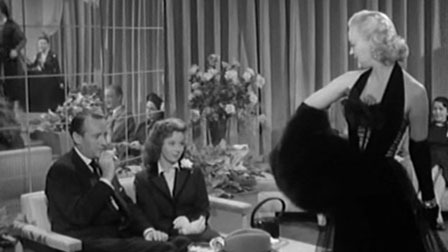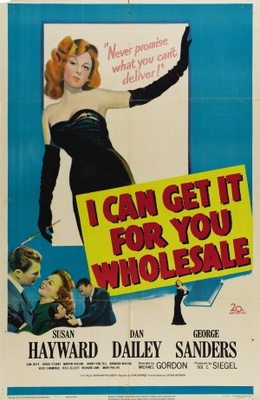I Can Get It for You Wholesale (1951)

 |
I Can Get It for You Wholesale (1951)
 Run time: Approved | 91 min | Drama Run time: Approved | 91 min | Drama Rating: 6.8 Rating: 6.8 Director: Michael Gordon Director: Michael Gordon Writers: Abraham Polonsky, Vera Caspary Writers: Abraham Polonsky, Vera Caspary Stars: Susan Hayward, Dan Dailey, George Sanders Stars: Susan Hayward, Dan Dailey, George Sanders |
| Storyline Hayword aces as a model-turned dress designer determined to make it in N.Y.C.’s garment industry. A flavourful production with top acting. |
|
| Details: | |







Jerome Weidman’s novel is the basis for the film of the same name. This film was a curiosity piece. Shown on a cable channel, it proved to be worth a look because of the general good adaptation of the book and the direction of Michael Gordon.
The movie takes a look at the "rag trade", or garment industry of New York in the fifties. We are presented with a trio of ambitious people who want to make it on their own. There’s Harriet Boyd, the show room model who has had it and wants to show her talents as a designer. Harriet and Cooper, the man in charge of the production need a great salesman who knows how to sell the affordable dress line to the big department stores, so they entice Teddy Sherman to join their team.
Things go smoothly, but Harriet is a woman with a vision that would be her worst enemy. Harriet Boyd feels flattered by Mr. Noble, a man who is influential in what women of a certain status would like to buy, and decides to start an expensive line, neglecting the orders placed with the firm. All this backfires when Teddy finds out the deception and wants out. In the end, Harriet sees the light and what Noble has been trying to do with her and goes back to the partners she left behind and Teddy, who is obviously much in love with her.
The film offers glimpses of what 7th Avenue looked like in that era and what goes on behind the production of the fashions that America wore before that industry was exported overseas by the same people that created it. The "Made in USA" label was soon a thing of the past as this industry is not the shadow of what it was.
Susan Hayward’s portrayal of the ambitious Harriet is what makes this movie worth seeing. George Sanders is perfect as Noble, the man who recognizes Harriet’s talents and wants her to come work for him. Dan Dailey is also excellent as the salesman with a lot of flair. Sam Jaffe is Cooper, the decent man who gambles all his savings in the business he knows well.
The film will not disappoint, as it keeps the viewer interested at all times.
This title at first sounded as though it might be a musical or at least a light comedy. But no, it’s a quite potent drama, well scripted and engagingly played by a strong cast.
Susan Hayward offers a staunch heroine, torn between strata extremes of the fashion industry, anchored by two men–both of whom have romantic leanings toward her.
George Sanders is seen as the higher up of the two, and he’s ideally cast. Few could bring off the cad type as well, and he plays it to the hilt here, as though relishing every moment.
The other suitor character showcases the dramatic ability of Dan Dailey, noted for lighter fare. Dailey is quite convincing as Hayward’s other love interest.
That dependable character actor, Sam Jaffe, is just fine as Hayward’s "conscious" and bridge between her callous ambition and fundamental simplicity.
Not available on vhs or dvd, this film is occasionally shown on cable or satellite networks.
Susan Hayward is a determined, talented and ambitious woman in "I Can Get it for You Wholesale," a 1951 film which also stars George Sanders, Dan Dailey and Sam Jaffe. The title comes from the novel but the actual plot is only very loosely taken from the book.
The beautiful Hayward plays Harriet Boyd, a dress model in a small business in New York's Garment District. She talks the owner (Sam Jaffe) into putting up some money and going into business with her so that she can launch her own line. She gets the top salesman (Dan Dailey) to do the same, and she manipulates her own sister into offering insurance money for Harriet's share in the business. Harriet's ability and drive get the business going, and she's all work. Though Danny Sherman (Dailey) is in love with her, she gives him the brush-off. The two eventually stop speaking when Danny catches having dinner with a wolf-like buyer (Harry von Zell). One night, at a big buyer's dinner, she meets J.F. Noble, the head of Noble's Department Store, probably comparable to Saks Fifth Avenue. She wants to launch a line of gowns, which will mean getting out of her contract with her partners. Noble wants more than Harriet's gowns; he wants Harriet as well.
This is a very good drama with fine performances from everyone involved. Hayward, of course, carries the film as a driven woman who ends up having to question not only what she really wants but her own ethics and sense of responsibility. Sanders is great as the elegant Noble, representing, in a way, the devil, who knows Harriet's heart but wants her to sell her soul. Sam Jaffe is perfect as the grandfatherly boss, and Dan Dailey steps out of his dancing shoes and proves himself a good leading man.
Highly recommended and a must for Hayward fans.
Fox filmed most of the exteriors on New York's Seventh Avenue to give the film some authentic flavour. Michael Gordon even filmed Susan Hayward and Dan Dailey among the unsuspecting workers, but when they filmed at Bonwit Teller, the gaping crowd tied up traffic for hours. Once again Susan Hayward was ideally cast and was able to match her wits with the master of suave, George Sanders. And the ads also lived up to their promise – "She Made Good – With a Plunging Neckline and the Morals of a Tigress!!!!".
Harriet Boyd (Susan Hayward) is a model with a burning ambition to be a designer and of course, being Susan Hayward, she is going to let nothing stand in her way. She wants to open her own fashion house and intends to take Teddy Sherman (Dan Dailey) salesman extraordinare and inside man and fatherly figure Sam Cooper (Sam Jaffe) with her. How she gets there is by lies, manipulation and stand over tactics (almost)!!! Even though she doesn't have the money to put in as a partnership, by a stand out lying performance she manages to get hold of her adoring sister's inheritance!!
"Sherboyco" goes off with a bang – it is everything the old firm was not – plush carpets with luxurious surroundings, even though their lines are only $10.95 dresses!! Sherman, who has always carried a torch for Harriet, can't stand to see her pawed by the buyers she wines and dines – but, boy she is more than capable of taking care of herself. This movie is filled with so many Hayward moments – her confrontation with her mother over her father's will, tearing a model's gown in a carefully "staged" temper tantrum. Hayward's acting comes so much from the heart – somehow, you can't imagine her being a cosy homebody!!
Enter J.F. Noble (George Sanders), owner of the most prestigious fashion house on 7th Avenue. He wants Harriet as a woman and as a designer and she wants to go too, but has to find a way out of her contract. She pleads with Sherman that her doctor has advised her early retirement as a way to calm her nerves (Hayward is at her "baddest" best). When that falls flat, she starts to sabotage the company by holding up the orders that Teddy is sending in, by making uncalled for expensive gowns. At the 11th hour (just before the boat is to sail for Paris with Harriet as an exclusive designer for Nobles) she has a change of heart and goes back to save the business that 10 minutes before she was plunging into bankruptcy.
Of course Susan Hayward is 90% of the show, but Dan Dailey shows he was not just a song and dance man and George Sanders is his usual caddish self. The title was changed to "Only the Best" (which sounds a much better title to me) for TV because at the time (1962), the musical version of the play was running on Broadway – it starred Lillian Roth and a young Barbara Striesand. The screenplay was adapted by Vera Caspary, who also wrote the novel "Laura".
Highly, Highly Recommended.